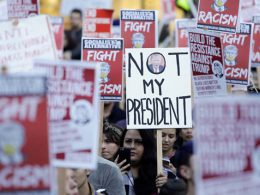By Manus Lenihan
Venezuela’s opposition leader Eduardo González has fled the country, disputing the results of the 28 July election. The government arrested six foreign nationals on 15 September, alleging that they were plotting to kill the president, Nicolas Maduro. In between those two dates, 23 people lost their lives in clashes between protesters and police, 200 were injured and 1,658 arrested.
The situation is complex and difficult to read amid a frenetic propaganda war by the US and its allies against the Maduro government. The dramatic political events are a reflection of the major crisis in the country, particularly over the last ten years. The economy has been in deep trouble since 2014, when a drop in oil prices massively undermined the county’s finances. As of 2023, there are over 7 million refugees and migrants from Venezuela around the world, mostly in Latin America, making it one of the world’s largest refugee crises – exceeded only by those of war-torn countries.
Bolivarian legacy
There has been a lot of water under the bridge since the optimistic days of the 2000s when President Hugo Chavez and the Bolivarian Revolution promised a new vision of ‘21st Century Socialism.’
In 1989, Venezuela’s right-wing government massacred protesters in the ‘Caracazo’ uprising. The working class, poor and radical sections of the military responded with the Bolivarian movement, which won the election in 1998 and has won every election since. When US-backed forces tried to launch the first of several coups in 2001, the population rose up in their millions, threw out the coup plotters, and restored Chavez, spurring him on to more radical measures which dramatically reduced poverty and gave confidence and organisation to working people.
But ever since 2014, when economic and political crises began, many who are opposed to socialism have been pointing to Venezuela and saying ‘We told you so’ – it’s another example, they say, of the failure of socialism. But there are major problems with this argument.
What went wrong
First, the Bolivarian movement has been in power since 1998. The economic crisis came in 2014. The ‘failure of socialism’, it appears, took a very long time. Clearly other factors were at play.
Which brings us to the second problem. It was not the sharing of wealth that threw the economy into crisis in 2014, but a shock in the global price of oil, Venezuela’s primary industry. Things got far worse in 2017, not because the state helped poor people, but because Donald Trump imposed even harsher sanctions on Venezuela. The country has basically been kicked out of the global economy.
Third, Venezuela is not socialist – it has been a capitalist country all along. Socialists fully support the Bolivarian ‘missions’, which dramatically improved life for working-class and poor people. But at the end of the day Chavez’s ‘21st century socialism’ never fully broke with the rule of the capitalists. A significant sector of the country’s lands and factories remained in the hands of corporations owned by wealthy people. The jobs and services on which working people depend are still wide open to the arbitrary and cruel winds of private greed, market forces, and the US-dominated global economy. The oil prices and sanctions are a case in point.
Finally, even before the death of Hugo Chavez in 2012, the government had reversed course on many of the more radical policies and methods of mass mobilisation which marked the radical period of the 2000s. This has deepened under Maduro.
Cynical hypocrisy
So much for ‘socialism’ being the root of all evil in Venezuela. But what position should socialists take in relation to the Maduro government and what do we say about the current situation?
Many of the accusations levelled against the Venezuelan government deserve scorn due to the hypocrisy of the accusers. Venezuela’s opposition forces are, at the end of the day, calling for a return to full power of the country’s traditional elites and for a pro-US foreign policy. There have been numerous arson attacks, terror campaigns and attempted coups (as recent as 2019) to this end. They have cried fraud on every election result since 2004.
Even if we accept the accusations of fraud in the July elections, the US state and its subservient allies in Europe have had contempt for the Venezuelan government’s popular mandate in every election since 1998 – they branded Maduro a ‘narco-terrorist’ and put a bounty on him – but suddenly in 2024 they are on their high horse about respecting the result.
What now after the elections
But what exactly happened in the recent election? The opposition claims to have won the popular vote by 7 million to 3 million, but these figures are difficult to take seriously, even if it is possible that they did in fact receive a majority. It is true that the state electoral bodies have broken with past practice by refusing to release results from many localities. However, the opposition appear to be resigned to defeat, for now.
The police campaign against opposition protests appears very heavy-handed, which is another sign of the turn by the Chavista government from popular mobilisation to increasingly brutal state repression.
The key point about the Maduro regime is that, rather than confronting the capitalist class, it concilated with them, all while forcing the worsening economic crisis onto the back of the working class. Not only has it failed to move the situation forward for working people, it has undone many of the gains of the Bolivarian revolution. Criticisms and warnings made from a left, socialist and revolutionary perspective during the 2000s and 2010s have unfortunately been borne out.
The masses of Venezuela – including those millions residing outside its borders – face a complex and challenging situation. To point a way forward they must rely on their own strength. That means building a revolutionary socialist alternative that goes beyond the limits of Chavismo, conscious of the need to break with capitalism and imperialism in order to defeat the reactionary right once and for all.












